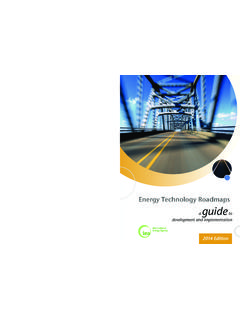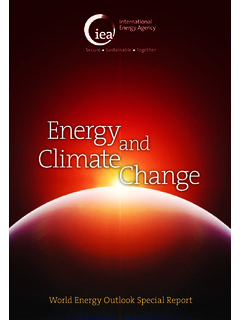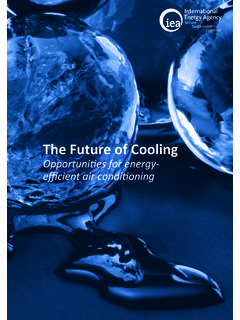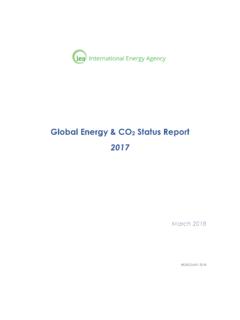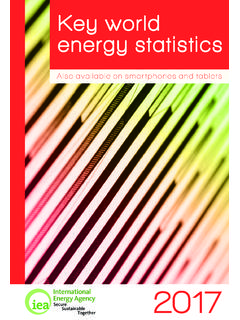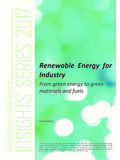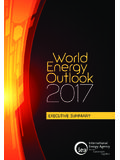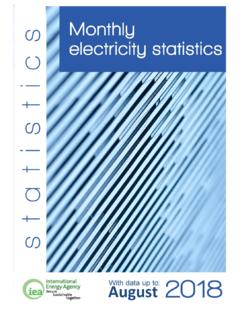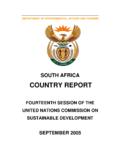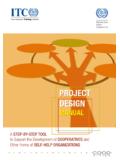Transcription of Energy Efficiency 2017 - International Energy Agency
1 Marke t Report Series Secure Sustainable Together Energy Efficiency 2O17. International Energy Agency . The International Energy Agency (IEA), an autonomous Agency , was established in November 1974. Its primary mandate was and is two-fold: to promote Energy security amongst its member countries through collective response to physical disruptions in oil supply, and provide authoritative research and analysis on ways to ensure reliable, affordable and clean Energy for its 29 member countries and beyond. The IEA carries out a comprehensive programme of Energy co-operation among its member countries, each of which is obliged to hold oil stocks equivalent to 90 days of its net imports.
2 The Agency 's aims include the following objectives: n Secure member countries' access to reliable and ample supplies of all forms of Energy ; in particular, through maintaining effective emergency response capabilities in case of oil supply disruptions. n Promote sustainable Energy policies that spur economic growth and environmental protection in a global context particularly in terms of reducing greenhouse-gas emissions that contribute to climate change. n Improve transparency of International markets through collection and analysis of Energy data. n Support global collaboration on Energy technology to secure future Energy supplies and mitigate their environmental impact, including through improved Energy Efficiency and development and deployment of low-carbon technologies.
3 N Find solutions to global Energy challenges through engagement and dialogue with non-member countries, industry, International organisations and other stakeholders. IEA member countries: Australia Austria Belgium Canada Czech Republic Denmark Estonia Finland France Germany Secure Greece Sustainable Hungary Together Ireland Italy Japan Korea Luxembourg Netherlands New Zealand Norway Poland Portugal Slovak Republic OECD/IEA, 2017 Spain International Energy Agency Sweden Website: Switzerland Turkey United Kingdom Please note that this publication United States is subject to specific restrictions that limit its use and distribution.
4 The European Commission The terms and conditions are also participates in available online at the work of the IEA. Marke t Report Series Energy Efficiency 2O17. F OREWO RD. FOREWORD. Energy Efficiency stands at a crossroads today. Strong Efficiency gains continued to be made in 2016, even as Energy prices fell. But at the same time, governments are not coming up with new policies fast enough, relying on existing regulations instead, precisely at the time when a pipeline of new Efficiency policies should be coming into force. There is a risk that Efficiency gains could take a step back. This issue is all the more important when you consider the impact that Efficiency is already having on the global Energy system.
5 This year, our report highlights the many ways in which Energy Efficiency is bolstering Energy security, reducing Energy spending and helping the environment. Notably, improved Energy intensity has been the biggest factor behind the recent flattening of global greenhouse gas emissions. The arguments for stronger action on Energy Efficiency have never been clearer. The IEA's Efficiency Policy Progress Index allows a deeper examination of the dynamics of global policy trends. It reveals very different rates of progress across countries and an increasing reliance on pre-existing policies to drive Energy Efficiency improvement. There was a noticeable slowdown in the implementation of new policies in 2016, and this trend appears to be continuing in 2017 .
6 And yet there is plenty of scope for further policy action. Over 68% of the world's Energy use is not covered by Efficiency codes or standards. Only four countries regulate the Energy Efficiency of trucks, a major source of fuel demand as well as emissions growth, and space-cooling demand is rising fastest in countries with the weakest air conditioning Efficiency regulation. Technological innovation is creating new opportunities for progress on Efficiency . Digitalization is beginning to have a significant impact on the Energy sector and Energy Efficiency is emerging as a key arena for innovation. It is creating exciting new opportunities for integrated solutions where Efficiency and renewable Energy work together to deliver clean Energy outcomes at the lowest cost.
7 As business models adapt to the digital Energy world, so too must policy. A key lesson from this report is that well-designed policy works. We are seeing plenty of good examples from all over the world and that is why the IEA is putting more emphasis on best practice policy exchange and helping countries learn from one another to focus on attacking the remaining 68% of global Energy use not covered by codes or standards. This is the reasoning behind our new Global Exchange Platform for Energy Efficiency , which I am confident will help people better understand Energy Efficiency trends and the policies that shape them. Dr Fatih Birol Executive Director International Energy Agency OECD/IEA, 2017 .
8 E NERGY E FFICIENCY 2017 3. A CKNOWLEDGEMENTS. ACKNOWLEDGEMENTS. The IEA's renamed Energy Efficiency 2017 was prepared by the Energy Efficiency Division (EEfD) of the International Energy Agency (IEA) under the direction of Brian Motherway, Head of EEfD, within the Directorate of Energy Markets and Security, led by Keisuke Sadamori. Samuel Thomas and Joe Ritchie co-ordinated and authored the report along with Jae Sik Lee, Sacha Scheffer, Peter Lemoine, Brian Dean, Jessica Glicker, Aang Darmawan and Julie Cammell. Former IEA colleagues Tyler Bryant (Fortis BC) and Fabian Kreuzer (UN-ESCAP) also made valuable contributions. This report benefited from important contributions from IEA colleagues including Laszlo Varro, Duncan Millard, Peter Fraser, Aad Van Bohemen, Laura Cozzi, Tim Gould, Melanie Slade, Pierpaolo Cazzola, Araceli Fernandez-Pales, Roberta Quadrelli, Urszula Ziebinska, Gianluca Tonolo, Elie Bellevrat, St phanie Bouckaert, Toshiyuki Shirai, Simon Bennett, John Dulac, Simon Keeling, Yoko Nobuoka, Sylvia Beyer, David Morgado, Jeremy Sung, Lucy Shedden, Kira West, Jacob Teter, Xi Xie, Zakia Adam, Marine G rner, Renske Schuitmaker and Sebastian Ljungwaldh.
9 Mark Ellis, Hans-Paul Siderius, Stuart Jeffcott, Maarten van Werkhoven, Steven Beletich and members of the Executive Committee from the IEA Technology Collaboration Programme on Energy Efficient End-use Equipment (4E) provided valuable analysis and commentary. Thanks to Lorcan Lyons, Trevor Morgan (Menecon) and Andrew Johnston (Words for Change) for review, writing and editing support; Rachael Boyd, Elizabeth Spong, Morgane Le Bagousse and B reng re Merlo for legal counsel; and the IEA Communications and Information Office, in particular Rebecca Gaghen, Jad Mouawad, Astrid Dumond, Katie Russell, Christopher Gully, Robert Stone, Bertrand Sadin and Therese Walsh, for assistance in finalising the report.
10 Issue experts and external contributors to boxes and other content were: Takuma Inamura (Ministry of Foreign Affairs, Japan), Peter Therkelsen (LBNL), Arlan Brucal (Grantham Research Institute), Gale Boyd (Duke University), Amandine Denis and Wei Sue (Climate Works Australia), Catherine Cooremans (University of Geneva), Cristina Cardoso and Joao Pedro Correia Bernardo (Directorate General of Energy and Geology, Portugal), Rob Youngs (Coalition for Green Capital), Steven Richardson (World Green Building Council), Camille Frandon-Martinez (Climate Bonds Initiative), Kristina Klimovich (PACEnow), Holmes Hummel (Clean Energy Works), Neelima Jain (EESL), Lily Zhao (EMCA), Donald Gilligan (NAESCO)
